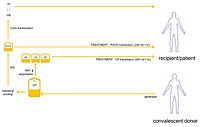
Photo from wikipedia
OBJECTIVE To determine the association between seroconversion status and outcome in admitted COVID-19 patients and compare inflammatory markers amongst them. STUDY DESIGN Single cohort observational study. PLACE AND DURATION OF… Click to show full abstract
OBJECTIVE To determine the association between seroconversion status and outcome in admitted COVID-19 patients and compare inflammatory markers amongst them. STUDY DESIGN Single cohort observational study. PLACE AND DURATION OF STUDY Indus Hospital and Health Network between 10th May and 10th July 2020. METHODOLOGY All admitted patients were tested serially for anti-COVID-IgM and IgG until their sera showed positive results. This was continued until their expiry or discharge. Those patients who remained negative for both anti-COVID-19-IgG and IgM were labeled as non-seroconverts. Demographics, comorbidities, inflammatory marker levels and outcome (alive/expired) were compared between seroconverts and non-seroconverts. RESULTS In 224 admitted patients, the median seroconversion time of IgM and IgG was six and seven days in survivors and non-survivors respectively. Expired patients displayed higher levels of procalcitonin (maximum), C-reactive protein, and Interleukin-6 (baseline and maximum). Of 34 non-seroconverts, 17 (50%) expired. Non-seroconverts significantly failed to develop fever and had lower levels of ferritin, CRP, and LDH. CONCLUSION Non-seroconversion in hospitalised COVID-19 infected patients indicated muted immune and acute phase response and was associated with poor outcomes. Hence these patients need to be carefully evaluated and managed. KEY WORDS Antibody response, Corticosteroids, Immunosuppression, SARS-Cov-2, Seroconversion.
Journal Title: Journal of the College of Physicians and Surgeons--Pakistan : JCPSP
Year Published: 2022
Link to full text (if available)
Share on Social Media: Sign Up to like & get
recommendations!